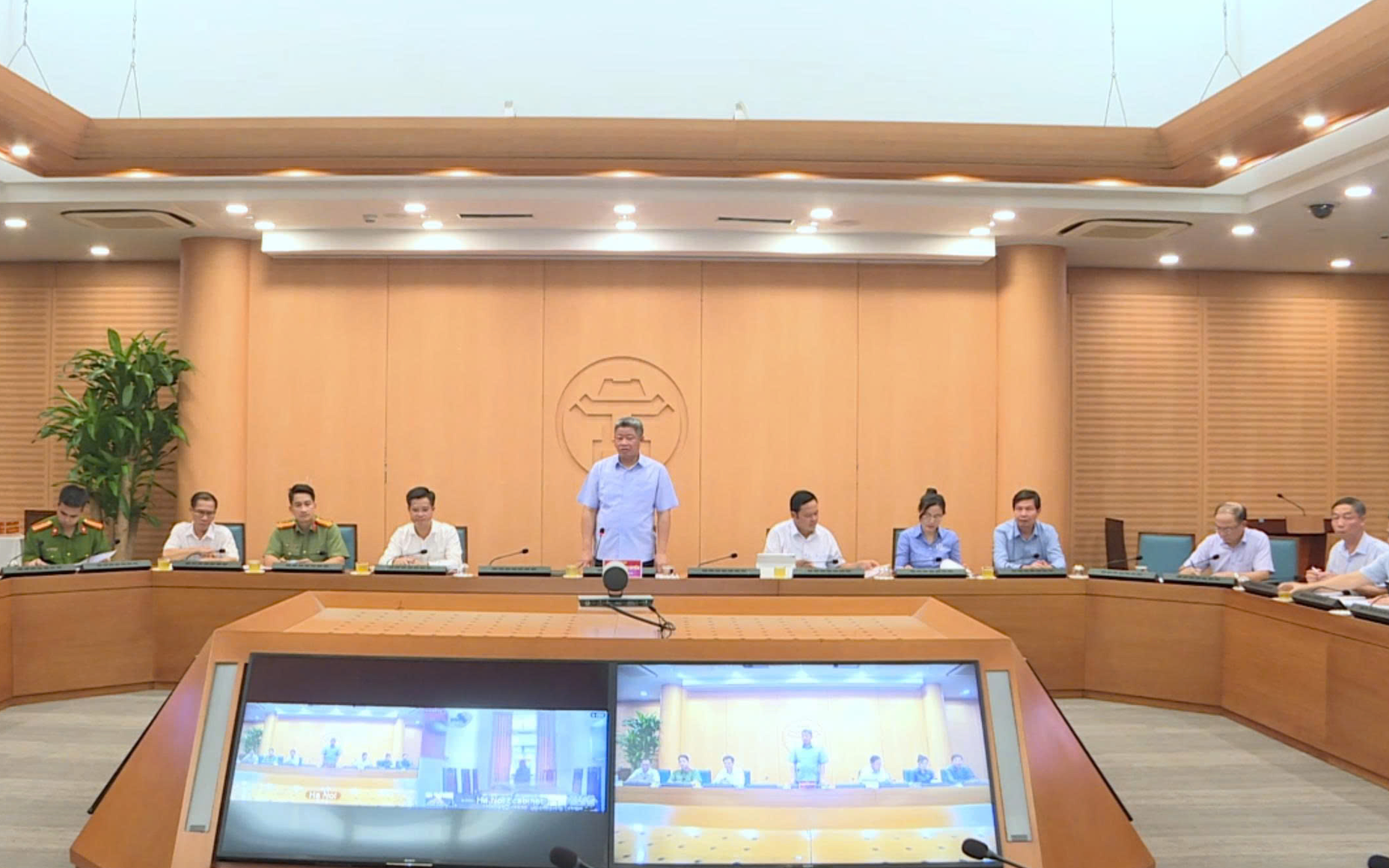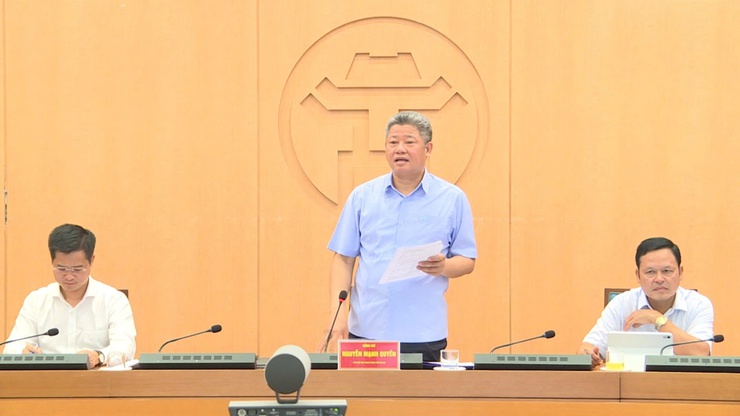Held at the municipal People’s Committee headquarters, the session gathered leaders of relevant departments and representatives from Doai Phuong, Bat Bat, and Yen Xuan communes, where outbreaks have been reported. The meeting was also connected online with 123 other communes and wards citywide.
Nguyen Dinh Dang, Head of the Hanoi Sub-Department of Livestock Production, Aquaculture, and Veterinary Services under the Department of Agriculture and Environment, reported that as of August 3, African swine fever had been detected in 22,316 farming households across 845 communes in 34 provinces and cities nationwide. A total of 154,996 pigs had died or been culled.
In Hanoi alone, outbreaks were recorded in 23 communes and 155 hamlets, affecting 490 farming households. The city had culled 10,592 pigs, amounting to a total weight of approximately 662,692 kilograms.

Overview of the meeting.
The first African swine fever outbreak in 2025 was recorded on June 16 in Dung Tien Commune (now Thuong Phuc Commune, formerly part of Thuong Tin District). By July 19, the outbreak had gone 21 consecutive days without new infections or positive test results.
African swine fever continues to spread in various provinces, including those bordering Hanoi, posing a high risk of transmission into the city. The African swine fever virus is highly resistant and can survive in the environment for extended periods. Current commercial vaccines mainly target Genotype II strains and are not effective against the new Genotype I plus II variant, which accounts for roughly 50 percent of current cases.
Prolonged heat combined with heavy rains and floods during peak season weakens livestock immunity and increases the risk of disease persistence and transmission. Illegal transportation and trade of unverified and unquarantined animal products remain widespread, especially with expanding transportation networks and administrative boundary changes.
Some farmers and households lack full awareness and compliance in reporting outbreaks, culling infected animals, and waste management. They also fail to strictly follow biosecurity protocols. Unlicensed backyard slaughtering still exists alongside licensed slaughterhouses in several areas.
Tracking the origin of animal products in markets remains difficult, particularly in informal or temporary markets, which are managed by commune-level authorities. Oversight requires coordination through inter-agency inspection teams, making routine and continuous monitoring difficult.
Representatives from Doai Phuong, Bat Bat, and Yen Xuan communes reported on their local prevention efforts and proposed that the city issue clear guidelines to support local African swine fever prevention. They also requested timely assistance in terms of personnel, supplies, and funding, as well as coordinated disinfection campaigns and concentrated containment efforts.
Ta Van Tuong, Deputy Director of the Department of Agriculture and Environment, stated that the department had advised the People's Committee to issue Plan Number 339 dated November 25, 2024, on prevention of diseases in livestock, poultry, and aquaculture in 2025.
The department also proposed Urgent Directive Number 10 dated August 1, 2025, to deploy urgent and synchronized African swine fever prevention measures. The department has issued its own guidance to local authorities to implement key disease control strategies.

Vice Chairman of the Hanoi People's Committee Nguyen Manh Quyen at the meeting.
The Hanoi Sub-Department of Livestock Production, Aquaculture, and Veterinary Services has formed five working teams to provide on-site support and guidance when outbreaks occur. These teams also work with the Hanoi Police and the Department of Industry and Trade to conduct joint inspections of pig slaughtering, transport, and trade. Authorities have prosecuted five individuals for illegally slaughtering, transporting, and selling dead or diseased pigs. In Suoi Hai Commune, two individuals were fined for illegally disposing of infected pig carcasses.
The Department of Agriculture and Environment has proposed seven upcoming measures, including regularly updating the disease situation, monitoring new virus variants, and adjusting prevention strategies accordingly. It also recommends tighter inspection and traceability of pork and pork products in markets, reviewing and updating the plan for centralized slaughterhouses to match major livestock zones, and encouraging investment in industrial-scale slaughterhouses connected to safe supply chains.
The department also seeks approval to use reserve chemicals for a city-wide disinfection campaign to eliminate viruses in the environment and prevent further outbreaks. In addition, it will strengthen supervision and technical guidance for disease prevention.
At the meeting, leaders from the Department of Health and Department of Industry and Trade urged residents not to slaughter or consume diseased pigs, avoid raw meat, and ensure food is thoroughly cooked. They also called for stronger enforcement against the sale of infected pigs and emphasized public education on the dangers of African swine fever.
In his concluding remarks, Vice Chairman Nguyen Manh Quyen called on all departments to take proactive steps in preventing and controlling livestock diseases, especially African swine fever. He stressed the need to establish a strong legal framework to attract investment in centralized slaughter facilities.
In the short term, the Department of Agriculture and Environment and relevant agencies must propose temporary centralized slaughter sites with trained personnel and local coordination to meet market demand and ensure a safe food supply. The city also needs to support livestock restocking and complete planning for concentrated farms in areas away from residential zones to promote safe and biosecure farming models.
Localities must actively implement disease control and culling measures based on real-time conditions. The Department of Agriculture and Environment should provide clear guidance and propose policies that align with practical needs. The Department of Culture and Sports should enhance public awareness campaigns to encourage responsible practices in livestock farming and disease reporting.